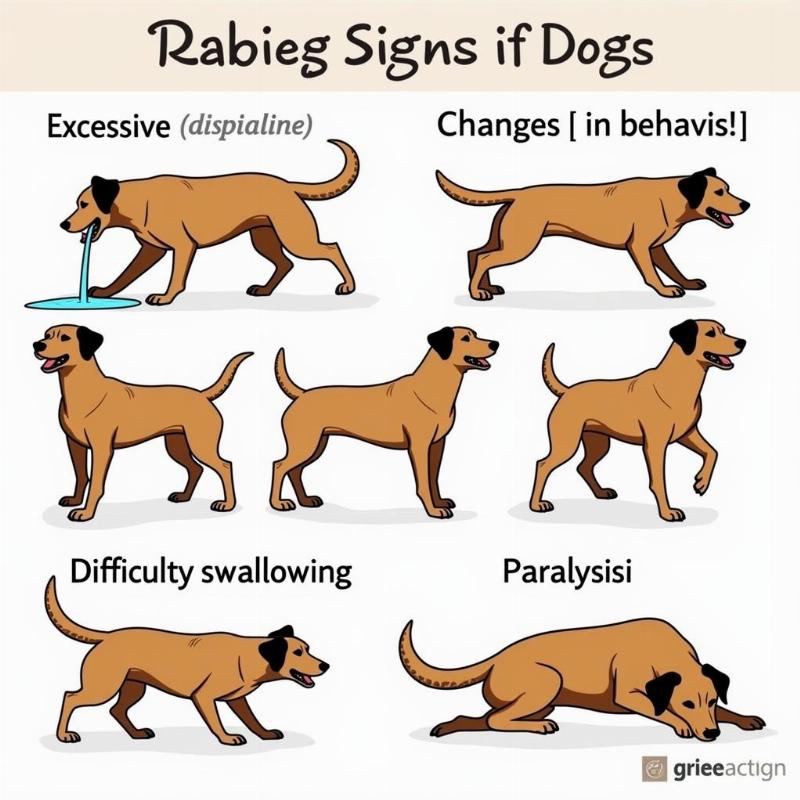Rabies is a deadly viral disease that affects mammals, including dogs. While rabies vaccination is highly effective, many pet owners still wonder, “Can dogs get rabies with rabies vaccination?” Understanding how the vaccine works, the importance of boosters, and the potential (though extremely rare) risks is crucial for responsible dog ownership in the United States. This article will address your concerns and provide a comprehensive overview of rabies and its prevention in dogs.
Understanding Rabies and its Prevention
Rabies is transmitted primarily through the saliva of an infected animal, usually via a bite. The virus attacks the central nervous system, and if left untreated, is almost always fatal. In the United States, rabies is a significant public health concern, and vaccination of dogs plays a vital role in controlling its spread. The rabies vaccine stimulates the dog’s immune system to produce antibodies against the rabies virus. These antibodies provide protection should the dog be exposed to rabies.
How Effective is the Rabies Vaccine?
The rabies vaccine is remarkably effective. Studies show that vaccinated dogs develop a strong immune response that provides robust protection against the disease. However, no vaccine is 100% foolproof. While exceedingly rare, there have been documented cases of vaccinated dogs contracting rabies. This usually occurs if the dog’s immune system is compromised, if the vaccine was improperly administered or stored, or if the dog was exposed to an exceptionally high dose of the virus.
Rabies Boosters: Maintaining Immunity
The initial rabies vaccine provides a certain level of protection, but booster shots are essential to maintain immunity throughout the dog’s life. The frequency of boosters varies depending on local regulations and the specific vaccine used. Generally, dogs receive their first rabies vaccine around 12-16 weeks of age, followed by a booster one year later. Subsequent boosters are typically administered every one to three years, as recommended by your veterinarian.
Why are Boosters Necessary?
Over time, the level of antibodies in a dog’s system can decline, reducing their protection against rabies. Boosters stimulate the immune system to produce more antibodies, ensuring ongoing protection. Keeping your dog’s rabies vaccinations up-to-date not only protects your pet but also helps maintain public health by limiting the spread of this devastating disease.
Can My Dog Still Get Rabies After Vaccination?
As mentioned earlier, the possibility of a vaccinated dog getting rabies is extremely low. However, if your vaccinated dog is bitten by a wild animal or a suspected rabid animal, immediate veterinary attention is critical. Your veterinarian may recommend a booster vaccination to ensure adequate protection.
Recognizing Signs of Rabies in Dogs
Even though your dog is vaccinated, it’s essential to be aware of the signs of rabies. These can include behavioral changes (aggression, anxiety, restlessness), excessive salivation, difficulty swallowing, paralysis, and seizures. If your dog exhibits any of these symptoms, especially after a bite from another animal, contact your veterinarian immediately.
 Signs of Rabies in Dogs
Signs of Rabies in Dogs
Conclusion
Rabies vaccination is a crucial part of responsible dog ownership in the United States. While the vaccine is highly effective, boosters are necessary to maintain long-term immunity. Although extremely rare, there is a slight chance a vaccinated dog could contract rabies. Understanding how the vaccine works, the importance of boosters, and the signs of rabies helps ensure your dog’s safety and contributes to public health. By staying informed and working with your veterinarian, you can keep your beloved companion protected from this deadly disease.
FAQ
- When should my puppy get its first rabies vaccine? Puppies typically receive their first rabies vaccine between 12 and 16 weeks of age.
- How often does my dog need a rabies booster? Booster frequency depends on local laws and the specific vaccine used. Consult your veterinarian for guidance.
- What should I do if my vaccinated dog is bitten by a wild animal? Contact your veterinarian immediately. A booster shot may be recommended.
- Is the rabies vaccine 100% effective? No vaccine is 100% effective. However, the rabies vaccine is highly effective and provides excellent protection.
- What are the signs of rabies in dogs? Signs can include behavioral changes, excessive salivation, difficulty swallowing, paralysis, and seizures.
- Are there any side effects to the rabies vaccine? Mild side effects such as soreness at the injection site or mild lethargy are possible but generally resolve quickly.
- Is rabies preventable in dogs? Yes, rabies is highly preventable through vaccination.
Beautdogs.us is your premier source for comprehensive and engaging information on dog care, breeds, and lifestyle in the United States. We offer expert advice, product reviews, and valuable resources for both new and experienced dog owners. Whether you are searching for the perfect dog breed for your family, looking for training tips, or need advice on dog health, Beautdogs.us is your trusted companion. Contact us today for more information! Email: [email protected] Phone: +1 501-555-7529.